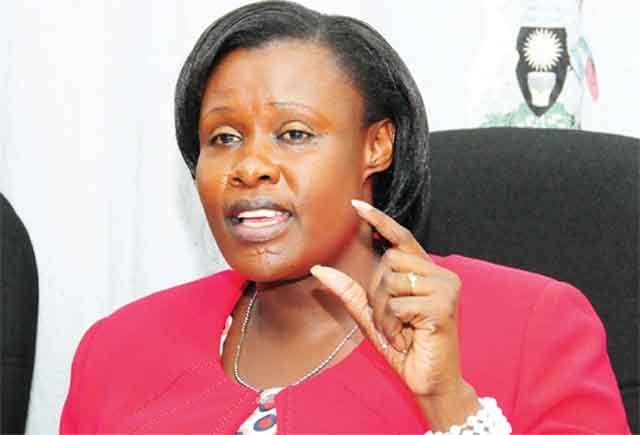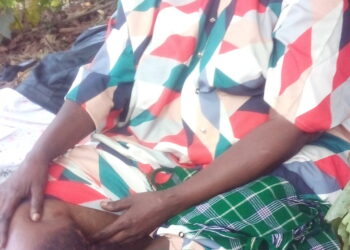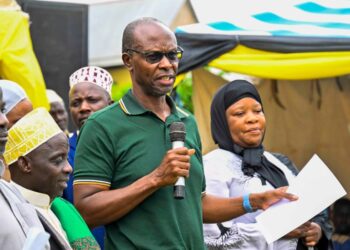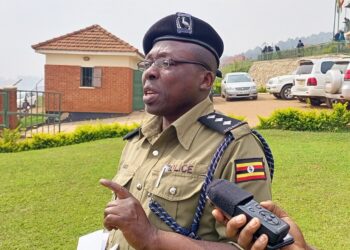On Sunday 9th October, Uganda will be celebrating its 60th Independence anniversary.
Since 1962, Uganda has gone through alot of political turmoil that caused change of governments.
However, do you know the number of Vice Presidents Uganda has had since Independence? We bring you the list:
1.William Wilberforce Kadhumbula Nadiope III
Born on April 29, 1910, William Nadiope was a son of Yosia Gabula Nadiope, the Paramount Chief of Busoga, whose family is traced back through countless generations of hereditary rulers to two twin ancestors, living in Ethiopia.
In 1958 he went into politics as the leader of a local party. Later he joined the Uganda People’s Union which merged with Milton Obote’s Uganda People’s Congress in 1960.
In October 1963 he stood for election as President of Uganda, however, he lost to the Kabaka of Buganda. Nadiope scored 27 votes while Kabaka Muteesa got 62. Having lost, he became the first Vice-President until the constitutional crisis of April 1966.
After the assassination attempt on Obote on December 19, 1969; Nadiope was detained along with Benedicto Kiwanuka and a number of other prominent politicians. He remained in detention until the military coup of January 25, 1971.
2. John Babiiha
Born on 17 April 1913, Babiiha studied at St Joseph’s College, Mbarara and St Mary’s College, Kisubi. He, later on, got a scholarship to Makerere University College, where he attained a diploma in veterinary science.
He started work as a veterinary officer from 1939 until 1946, when he joined the Toro kingdom government, as secretary and then assistant treasurer to the local Parliament.
Babiiha served as Uganda’s first republican Vice President after the abolition of traditional institutions in 1967, he became Uganda’s first Republican Vice President under the Uganda People’s Congress which was led by Apollo Milton Obote. He also served as the Minister of Animal Resources under Milton Obote. He is believed to have founded the Uganda People’s Congress Party in 1959 with Obote, Sam Odaka and Felix Rwambarari.
On 19th December 1969, Babiiha temporarily assumed control of government and declared a national state of emergency when the Uganda People’s Congress party president and the then President of Uganda Milton Obote got injured in an attempted assassination.
After the military coup in 1971, Babiiha retired immediately to his farms. He died in March 1982 and was buried at his home in Kibimba village, Fort Portal municipality.
3. Mustafa Adrisi Abataki
Mustafa Adrisi was born into the Picara clan of the Aringa ethnic group in the Yumbe district. He enrolled in the Lodonga Demonstration Primary School in Lodonga.
After completing the fourth grade, the Catholic missionaries in charge of the school attempted to convert him from Islam to Christianity and gave him the Christian name Christopher. Adrisi instead dropped out and never completed his education. As a result of this, he was never fully literate.
Although he was not fully literate, Adrisi was a fearful military officer and because of this, in January 1977 President Amin removed him from his post as Army chief of staff and appointed him Vice President of Uganda.
Amin had ruled Uganda without a vice president for six years, and his decision to give Adrisi the job probably stemmed from his wish to appease soldiers who wanted the dismissal of Brigadier Hussein Marella, an ally of Amin who had killed a prominent Lugbara officer.
As the Ugandan war effort collapsed, Adrisi fled to Sudan where he claimed to retain the post of Vice President. Adiris struggled with health problems in his later life and died in 2013. Over the course of his life, married eight women and fathered multiple children.
4. Paulo Frobisher Muwanga Seddugge Muyanja
Paulo Frobisher Muwanga Seddugge Muyanja was born in Uganda on 4 April 1924. He joined the East African Posts and Telecommunications Administration (1943–50) before entering politics in 1950.
After overthrowing Idi Amin, Muwanga served briefly as minister of internal affairs, first under President Yusuf Lule and then under President Godfrey Binaisa.
However, Binaisa attempted to have him demoted to ambassador in February 1980, but Muwanga appealed directly to the National Consultative Commission. He was reappointed, this time as minister of labour, the same month, and held that position until May 1980.
On 12 May 1980, the army overthrew Binaisa and installed a six-man Military Commission headed by Muwanga. The commission was the de facto president of Uganda for a few days until the establishment of the Presidential Commission of Uganda. That commission, with Muwanga as chairman, held the powers of the president of Uganda between 22 May and 15 December 1980.
Following the elections held on 10 December 1980, Muwanga installed himself as the head of the Electoral Commission and declared Milton Obote’s Uganda People’s Congress the winner. Between 1980 and 1985, he served as Vice President of Uganda and minister of defence under Obote.
He was arrested in October 1986, acquitted in 1988, and detained again from 1989–90. Mr Muwanga died on 1 April 1991 at Nsambya Hospital near Kampala, where he had been under treatment.
5. Dr. Samson Babi Mululu Kisekka
Dr Kisekka was born on 23 June 1912. He was a medical doctor with brilliant brains, and he is the fifth Vice President of Uganda serving from 1991 to 1994 under President Yoweri Museveni. He also worked as a medical doctor and diplomat. He was closely associated with current President Museveni.
He also served as Prime Minister of Uganda from 1986 to 1991. Dr.Kisekka was known as a hard-working statesman, and an advocate of mixed farming, which activities covered horticulture and dairy farming. As a politician, he supported an end to ethnic tensions and a government without corruption.
Dr Kisekka was a recipient of numerous awards and honours both on a national and international level the most recognizable ones being listed in the Men of Achievement-International Directory of International Biography, “International Who’s Who of Intellectuals”, the first Ugandan to ever be included, decorated with Paul Harris Fellowship-Rotary International. He considered the unity of Uganda as the best mission for the political leadership of the country. He died on 25 October 1999
6. Specioza Naigaga Wandira Kazibwe
Specioza Kazibwe was born in Iganga District on 1 July 1954. She attended Mount Saint Mary’s College Namagunga, a prestigious all-female boarding high school affiliated with the Catholic Church, located on the Kampala-Jinja Highway, near the town of Lugazi. In 1974 she entered Makerere University School of Medicine, where she studied human medicine, graduating with a Bachelor of Medicine and Bachelor of Surgery degree in 1979. She later obtained the degree of Master of Medicine, also from Makerere University Medical School, specializing in General Surgery.
Kazibwe began her political career as a Chairperson of Chairpersons of Halls of Residence at Makerere University Kampala (1975-76) – the equivalent of a University Guild President, which had been abolished by then President Idi Amin Dada. She later became a member of the youth and women’s wings of the Ugandan Democratic Party. She won her first election as a village leader, on the ticket of the National Resistance Movement (NRM) in 1987. She was later elected Women’s Representative for Kampala District and became Chairperson of the Advisory Committee for Museveni’s election campaign.
In 1996, she was elected Member of Parliament for the constituency of Kigulu South in Iganga District. From 1994 until 2003, Speciosa Kazibwe served as Uganda’s Vice President and as Minister of Agriculture, Animal Industry and Fisheries.
In Uganda, Dr Kazibwe was the sixth vice president serving from 1994 to 2003, making her the first woman in Africa to hold the position of vice president of a sovereign nation.
7. Gilbert Bukenya
He was born on 5 August 1949, in the village of Lwantama in Kakiri sub-county, in Busiro County, in present-day Wakiso District.
Bukenya entered politics in 1996 and was elected Member of Parliament (MP) for the Busiro North constituency. He also served as chairman of the National Resistance Movement (NRM) parliamentary caucus. He served as chairman of the NRM in the Buganda region. Bukenya subsequently became Minister of State for Trade and Industry before being elevated to the post of Minister of the Presidency. He became Vice President in 2003 replacing Specioza Kazibwe.
He later stood for the post of Secretary General of the NRM and lost to Amama Mbabazi and in May 2011, he was replaced as Vice President of Uganda by Edward Ssekandi.
8. Edward Ssekandi.
Ssekandi was born in Masaka District on 19 January 1942. He graduated with honours from the University of East Africa with a Bachelor of Laws degree. He also holds a Diploma in Legal Practice from the Law Development Center in Kampala, Uganda’s capital and largest city.
From 1973 until 1978, he served as a lecturer at the Uganda Law Development Centre. Between 1978 and 1979, he served as the Acting Director of the Law Development Centre. He was a delegate to the Constitutional Assembly, which drafted the 1995 Ugandan constitution, from 1994 until 1995.
He joined Politics in 1996 and he was elected to the Parliament representing Bukoto County Central, He was re-elected from that constituency in 2001, 2006 and 2011. He served as the eighth vice president of Uganda from 24 May 2011 to 21 June 2021. Prior to that, he served as the Speaker of Parliament from 2001 to 2011.
9.Jessica Rose Epel Alupo
Commonly known as Jessica Alupo, was born in Katakwi District on 23 May 1974 and serving as the ninth and current Vice President of Uganda since 2021.
Alupo joined politics in 2001 as a women’s presentative of Katakwi District running on the ticket of the National Resistance Movement (NRM) political party. She won and was re-elected in 2006. In 2009, she was appointed as state minister for youth and children affairs. In 2011, she was re-elected to her parliamentary constituency. In the cabinet reshuffle of 27 May 2011, she was promoted to the post of minister of education and sports. She replaced Namirembe Bitamazire, who was dropped from the cabinet.
Alupo is a trained military officer, she underwent the officer cadet course at the Uganda Junior Staff College in Jinja. She holds a Bachelor of Arts in political science and linguistics, obtained in 1997 from Makerere University. Her first master’s degree, the Master of Arts in international relations and diplomacy, was also obtained from Makerere University in 2008. She also holds a Diploma in public administration and management, obtained in 2008 from the Uganda Management Institute (UMI). Her second master’s degree is a master’s in public administration and management, obtained in 2009, also from Makerere University.
Do you have a story in your community or an opinion to share with us: Email us at editorial@watchdoguganda.com













